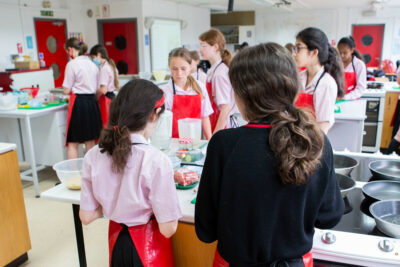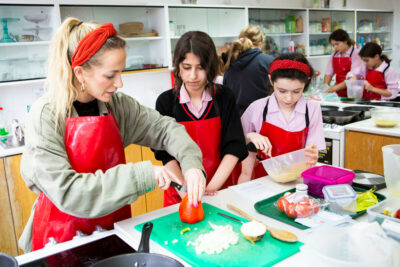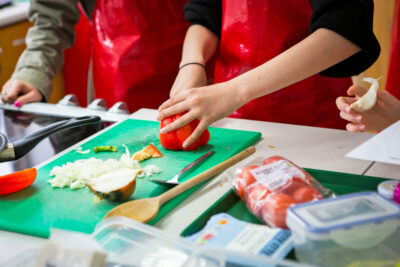Curriculum Vision and Intent
To develop confident, creative and curious students who can respond to real life design challenges with autonomy. All students, regardless of when they end their Design and Technology journey, should leave as confident students with an appreciation of design and technology in a wider context.
KS3 curriculum and assessment
 Year 7 experience a wide range of fun and exciting projects that teach valuable skills in the workshop as well as understanding of different materials and how they work:
Year 7 experience a wide range of fun and exciting projects that teach valuable skills in the workshop as well as understanding of different materials and how they work:
- Experiment and develop skills working with wood, textiles and different ingredients
- Learn about levers and mechanisms
- Develop computer aided design skills to create a repeat pattern
- Learn and develop knowledge food hygiene, nutrition and diet
Assessment – There are a variety of assessment opportunities through practical outcomes, design ideas, research and evaluative skills. plus the development of multiple choice and short response exam practice skills.
Year 8 work in more depth on projects, honing practical skills, improving resilience and problem-solving whilst developing independence in the workshop:
- Develop design thinking skills and strategies working iteratively with metals, polymers and wood.
- Testing and experimenting with ideas through sampling modelling and prototyping in a variety of materials.
- Developing design communication skills through isometric and orthographic drawing, inc CAD.
- Building scientific knowledge of ingredients and their function.
Assessment -There are a variety of assessment opportunities through practical outcomes, design ideas, research and evaluative skills plus the development analytical skills and medium response exam practice skills.
Year 9 deepen their understanding of DT in the world around them whilst developing products that help various needs and users:
- Work collaboratively on the Design Ventura competition led by the Design Museum. Involves responding to a live brief and potentially having a product sold in the shop.
- Hone specialist techniques in textiles through making a 3D garment – a hoodie.
- Experiment with a range of fine processing techniques shaping and forming metals, polymers and wood.
- Develop cultural awareness of food and the wider impact.
Assessment – There are a variety of assessment opportunities through practical outcomes, design ideas, research and evaluative skills plus the development of critical analysis skills and extended response exam practice skills.
KS4 curriculum and assessment
At KS4 Design and Technology becomes an option and separates into two GCSEs; GCSE Design and Technology and GCSE Food Preparation and Nutrition. Students can select one to study further.
GCSE Design and Technology
 Now students have a range of skills, KS4 is all about continuing to develop specialist skills in at least one material area. Students also start to really develop problem-solving skills and the ability to design in a range of different contextual themes and for different users:
Now students have a range of skills, KS4 is all about continuing to develop specialist skills in at least one material area. Students also start to really develop problem-solving skills and the ability to design in a range of different contextual themes and for different users:
- Develop knowledge of forces and stresses and how to counteract these to solve problems in bag design.
- Use anthropometric data and primary and secondary research to inform design ideas.
- Widen knowledge of past and present professionals in design through trips to museums and exhibitions.
- Develop appreciation of design in a wider context i.e. the environment, and new and emerging technologies in design.
Assessment – There are a variety of assessment opportunities through practical outcomes, design ideas, research and evaluative skills, plus developing experience of a range of GCSE style questions.
Final assessment in KS4 comprises:
Non Exam Assessment – Design, make and evaluate (coursework) completed in class over approximately 35 hours and a written exam on the design and make principles sat in a final exam in the summer of year 11. Each element is worth 50% of the final grade in Design and Technology.
Examining board – AQA https://www.aqa.org.uk/subjects/design-and-technology/gcse/design-and-technology-8552
GCSE Food Preparation and Nutrition
 Food Preparation & Nutrition is based upon teaching key life skills through ensuring students develop a thorough understanding of nutrition, healthy eating, food provenance and the working characteristics of ingredients. The course is divided into 6 key learning areas listed below, and students will work on a variety of projects that build on their existing knowledge and skills;
Food Preparation & Nutrition is based upon teaching key life skills through ensuring students develop a thorough understanding of nutrition, healthy eating, food provenance and the working characteristics of ingredients. The course is divided into 6 key learning areas listed below, and students will work on a variety of projects that build on their existing knowledge and skills;
- Food commodities
- Principles of nutrition
- Diet and good health
- The science of food
- Where food comes from
- Cooking and food preparation
Future careers
This course could lead into roles such as a chef, food buyer, food technologist, food developer, food photographer, food stylist, nutritionist, teacher, food Scientist and many more.
Final assessment in KS4 comprises a written exam: Food preparation and nutrition (50%), a Non Exam Assessment (NEA): Task 1: Food investigation (15%) in a written report and a written portfolio and practical task Non Exam Assessment (NEA): Task 2: Food preparation assessment (35%)
Examining board – Eduqas https://www.eduqas.co.uk/qualifications/food-preparation-and-nutrition-gcse/#tab_overview
KS5 curriculum and assessment
Design and Technology: Fashion and Textiles is offered at A-Level. This creative and thought-provoking qualification gives students the practical skills, theoretical knowledge and confidence to succeed in a number of careers, especially in the creative industries:
- Investigate historical, social, cultural, environmental and economic influences on design and technology
- Have the opportunity to work towards live design briefs led by wool4school
- Develop specialist design and making skills through the ever popular architecture project
- Develop a wide range of technical principles and design and make skills.
Final assessment at KS5 comprises:
Non Exam Assessment – Design, make and evaluate (coursework) completed in class over a set amount of time, and two written assessments on the technical principles of design and technology and the design and make principles of design and technology. The NEA is worth 50% of the final A-level and collectively the written exams are also worth 50%.
Examining board – AQA https://www.aqa.org.uk/subjects/design-and-technology/a-level/design-and-technology-fashion-and-textiles-7562
Extra and super-curricular opportunities
- Trips to the Fashion and Textiles museum
- Design workshops
- Trips to the Victoria and Albert Museum
- Visits from people in the creative industries
Future opportunities (careers, university courses)
Further education paths: Foundation Art Courses – Degree at University in Design, Arts, Fashion, Architecture, Product design, Set design
Possible careers: fashion designer, textiles designer, costume designer, printing technician, dress maker, tailor, visual merchandiser, interior design, stylist, teacher.

